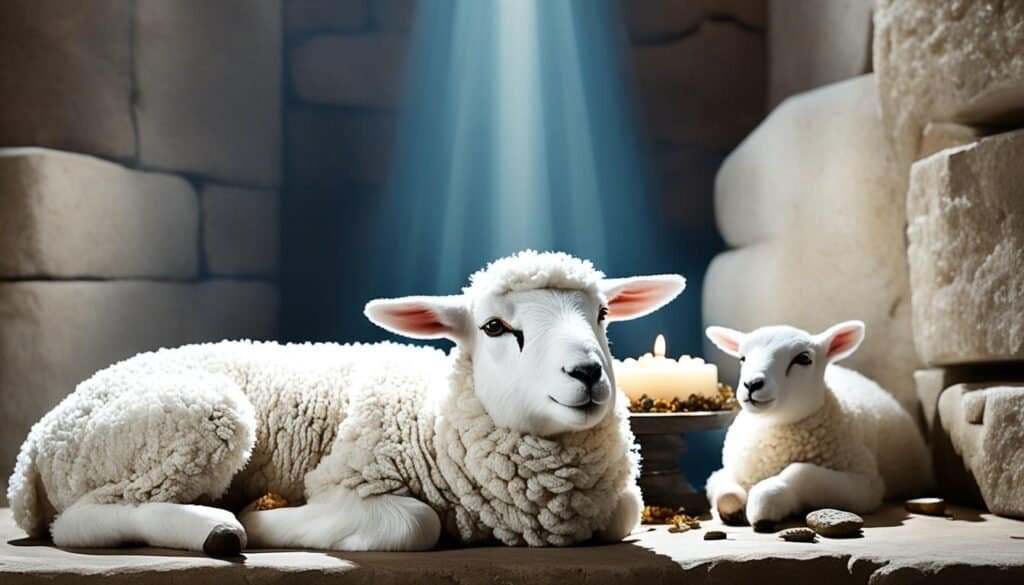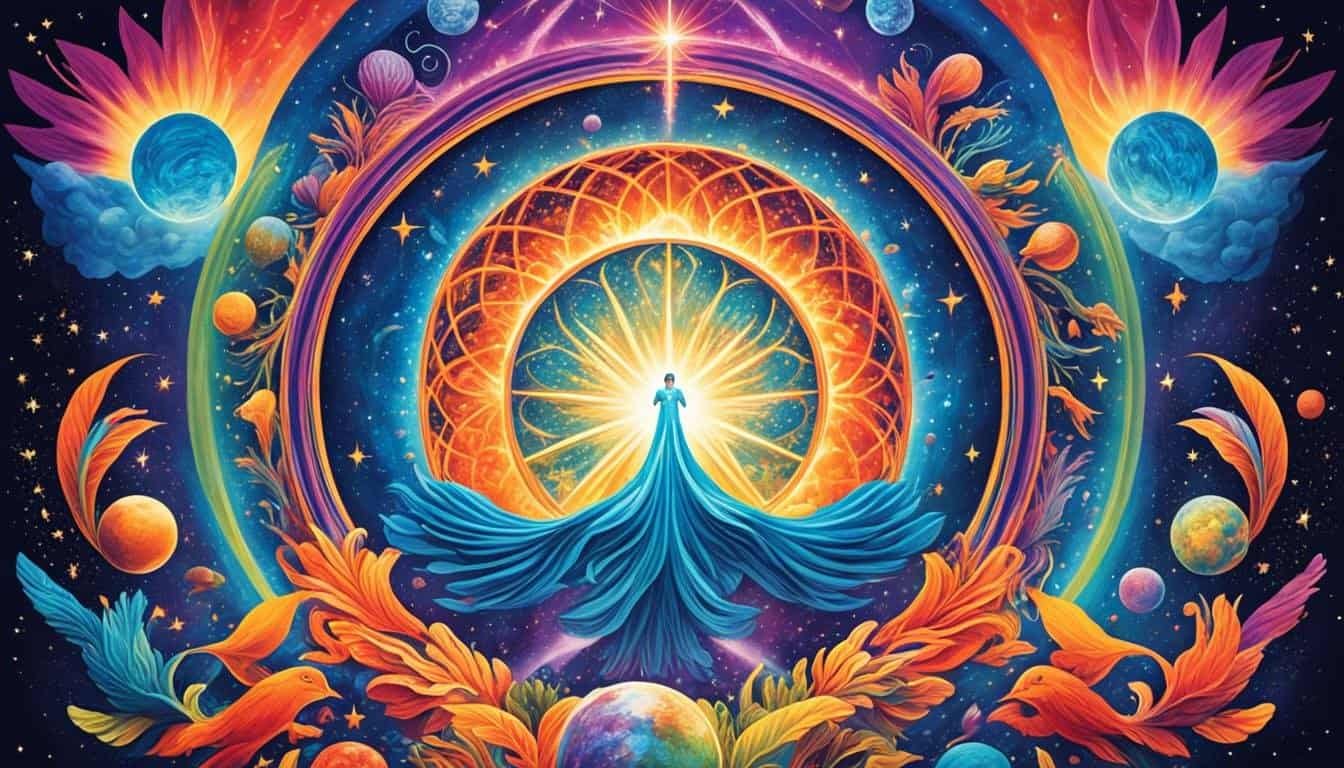Have you thought about how our views on faith and the divine have changed over time? The first book of the Bible, Genesis, shows us 12 new theological ideas. These ideas still affect what we believe today. They range from believing in one God to hoping for a savior. Join us as we explore Genesis’s deep theological meaning.
Key Takeaways:
- Genesis reveals 12 revolutionary theological concepts that have shaped our understanding of faith and the divine.
- Monotheism, the belief in a single, all-powerful God, challenged the prevailing polytheistic worldviews of the time.
- The concept of creation ex nihilo, the belief that the universe was made from nothing by God’s word, highlights His power and authority.
- Genesis establishes humanity’s special place in creation, being created in God’s image and entrusted with dominion over the earth.
- The story of the fall of man introduces the concept of sin and its consequences, shaping our understanding of human nature and the need for redemption.
Monotheism: The Radical Notion of a single, all-powerful God
In ancient times, people believed in many gods, each representing different parts of life and the world. Genesis, however, introduces a new idea: monotheism.
This word comes from the Greek “mono,” meaning one, and “theos,” which means god. It’s about believing in a single, all-powerful God who made and controls everything. This change in thinking began with Genesis, influencing Judaism, Christianity, and Islam.
“Hear, O Israel: The LORD our God, the LORD is one.” – Deuteronomy 6:4
In Genesis, God is shown as the sole creator of everything. This was a huge change from believing in many gods who each had control over different parts of the world.
It marked the start of believing in one God who is above all and everyone. This idea changed how people looked at the divine, laying the foundation for years of religious teachings.
Monotheism shapes how we view religion and philosophy. It underlines that God is one and rules over all. It speaks to His endless power, knowledge, and His love for all people. God’s care knows no bounds.
“I am the LORD, and there is no other; apart from me, there is no God.” – Isaiah 45:5
The concept introduced in Genesis still influences beliefs today. It set the stage for faith in one God and deeply influenced the Abrahamic religions. This continues to guide spiritual seeking and has played a vital role in human history.
Key Takeaways
- The book of Genesis introduces the radical concept of monotheism, challenging prevailing polytheistic worldviews of the time.
- Monotheism is the belief in one God, a single, all-powerful entity who created and governs the universe.
- This theological shift laid the foundation for the Abrahamic faiths, including Judaism, Christianity, and Islam.
- Belief in one God emphasizes His unity, sovereignty, and universal love for all humanity.
- Genesis’ introduction of monotheism has had a lasting impact on religious belief systems and shaped the course of history.
Creation Ex Nihilo: The Universe Made from Nothing
Genesis introduces a game-changing idea: creation ex nihilo, meaning the universe came from nothing, by God’s word. This stands against the idea that the world always existed. It shows God’s great power and authority.
Genesis explains the universe was not made from existing stuff. Instead, it began to exist when God spoke. Creation ex nihilo is a key point in how we understand where our world came from and its nature.
“In the beginning, God created the heavens and the earth.” – Genesis 1:1
This line captures creation ex nihilo perfectly. It tells us the universe wasn’t always here. God made everything from nothing, showing His unlimited power.
Thinking about creation ex nihilo shows how little we understand God’s greatness. It shows God’s divine side and His incredible creativity. This concept encourages us to think about the world’s mysteries and appreciate its wonders.
This image shows how grand and stunning the universe is, connecting us with creation ex nihilo. Looking at space, we see the amazing power of the Creator who made it all from nothing.
Creation ex nihilo emphasizes God’s word in how we see the world’s start. Throughout Genesis, God’s words create order and meaning. This shows how important His words are for our truth and direction.
To sum up, creation ex nihilo in Genesis changes how we think about the world’s start. With His word alone, God made the universe. This concept helps us see the great mystery and wonder of creation, pointing to God as its true Maker.
Humanity’s Special Place in Creation
Genesis gives us the story of how humanity began and our unique place. Different from animals, Genesis says we are made in God’s image. This shows that every person is special and full of dignity.
God created us to be like Him, giving us qualities that show His nature. This makes us different from all other living things. It gives us a holy job and a meaningful life purpose.
“Then God said, ‘Let us make mankind in our image, in our likeness, so that they may rule over the fish in the sea and the birds in the sky, over the livestock and all the wild animals, and over all the creatures that move along the ground.'” (Genesis 1:26, NIV)
Genesis describes how we have a special place as rulers over the earth. It’s our job to take care of the planet and its animals. This reflects God’s own care for his creation.
We work with God to take care of the world. Our job is to look after it, not to use it up. We should remember that everything belongs to God.
We’re given the important task of protecting and taking care of the earth, animals, and God’s creation. This is part of our role as God’s partners in caring for what He has made.
The Value of Human Life
Being made in God’s image means all people are valuable. No matter who we are, we have much worth. This is a key teaching from Genesis.
Genesis reminds us that we all reflect God’s image. This makes each person special and deserving of respect. It’s a call to love everyone and work for fairness and kindness.
Our Role in God’s Divine Plan
Genesis reveals that we’re central to God’s plan. As images of God, we can connect with Him and show His qualities. This is a big deal for humankind.
This partnership with God means we have great abilities. We can create, love, think, and seek spiritual things. We’re part of making the world better, bringing hope and healing.
Embracing our Responsibility
Realizing our unique place in creation inspires us to humble, thankful care for life and nature. We must cherish and protect the world and its people as God’s stewards.
We should value human life and care for the earth. Doing this, we honor God’s plan and help create a world of love, fairness, and peace.
| Key Points | Genesis and Humanity’s Special Place |
|---|---|
| 1 | Humans are created in the image of God, setting us apart from the rest of creation. |
| 2 | We are entrusted with dominion over the earth and its creatures, with the responsibility to care for and steward God’s creation. |
| 3 | Being made in God’s image confers inherent worth and dignity on every human life, irrespective of differences. |
| 4 | Humanity plays an essential role in God’s divine plan, participating in His ongoing work of redemption and transformation. |

The Fall of Man: Sin and Its Consequences
In the book of Genesis, we learn a sad tale. It’s about the turning point in human history. This story talks about sin and its big impacts, like death and being away from God.
The fall happened when Adam and Eve ate the forbidden fruit. This was the first sin. It changed us forever and started our struggles with sin.
“And the Lord God commanded the man, saying, ‘You may surely eat of every tree of the garden…’ – Genesis 2:16-17
After eating the fruit, we became distant from God. The sin broke our close bond with Him. This change has many bad effects on us.
This story also shows our nature. Often, we pick wrong things over what’s good. It shows the internal fight we have because of sin.
The Consequences of Sin
Sin brings about death. This includes our end on earth. It’s a very serious result of sin.
It also brings moral and spiritual death. This means being far from God and feeling empty. We all long to be close to God again.
But, there’s hope in the face of sin’s effects. The Bible tells us about God’s plan to save us from sin. This plan brings hope and healing. We’ll explore this more in what’s to come.
The Consequences of the Fall of Man
| Consequences. | Description. |
|---|---|
| Physical Death. | The eventual end of every human life on earth. |
| Moral and Spiritual Death. | Separation from God’s holy presence, resulting in spiritual emptiness and alienation. |
| Brokenness and Struggles. | Internal conflicts arising from our fallen state. |
This table sums up the fall’s effects. It shows how serious sin is. Yet, it points to our need for God’s saving grace.
The Promise of Redemption and a Future Deliverer
After the fall in Genesis, a small hope shines. This hope is from the promise of a savior and a future rescue. These ideas bring comfort when times are tough and help us mend our relationship with God.
Genesis shows how much God loves people despite everything. He promises to send a savior. This savior will fix the break between people and God. This promise shows there’s always hope and that God keeps his promises.
The promise of being saved reaches deep into our sadness. It reminds us our errors aren’t the end of our story. When we’re at our lowest, that’s when we can change and reconnect with the one who made us.
In Genesis, we see everyone waiting for the savior to come. The story starts with the hope of a person who will beat evil. Then, it moves to God promising Abraham great things. We see God’s plan to save us slowly taking shape.
Jesus is the savior everyone was waiting for in Genesis. Through his life, death, and coming back to life, he offers a way back to God. He gives forgiveness, fixing what’s broken, and life forever to all who trust him.
A Time of Reconciliation and Restoration
Genesis starts the story of fixing things with God and each other. It tells us God’s promises will some day all come true. This is a message of hope even in a world that seems broken.
Even in our hard times, Genesis tells us to keep hoping for a rescue. It asks us to trust God is making things better, even when we can’t see it. It tells us God will turn everything to good for those who love him.
Genesis tells us about the hope we have by being saved and the love God has for us.

Our journey back to God is something we do together. We help and cheer each other on as we walk together.
The promise of being fixed with God doesn’t just change us. It changes the way we live together. By working for peace and being friends with each other, we help make the world a better place.
Understanding God’s Covenant in Genesis
In Genesis, we learn about a covenant, a binding promise between God and His people. This concept lays the groundwork for understanding God’s deep relationship with humanity. It shows His unwavering commitment and faithfulness over time.
The covenant is more than just a deal. It’s a sacred bond that connects the Divine with us. This covenant marks God’s wish for a lasting relationship. It’s based on trust, love, and an exchange of duties.
“For I will establish my covenant as an everlasting covenant between me and you and your descendants after you for the generations to come, to be your God and the God of your descendants after you.” – Genesis 17:7
The covenant in Genesis isn’t short-lived. It extends through generations, showing God’s lasting dedication to His people. It’s the groundwork for developing God’s chosen people and human history.
One key covenant in Genesis is with God and Abraham. God vows to bless Abraham and his family. This covenant leads to the birth of Isaac, beginning the Jewish ancestry.
Another vital covenant is with Noah after the flood. God promises not to flood the earth again, with the rainbow as a sign of this pledge.
The idea of a covenant shapes our view of God’s nature. It highlights His deep love, unwavering trustworthiness, and His protection over His people. This concept shows God’s desire for a close relationship with humanity.
The covenant also reminds us of our duties. We should uphold our end by following God’s ways. This covenantal agreement gives us direction, meaning, and purpose in life.

| Covenant | Key Element | Example |
|---|---|---|
| Abrahamic Covenant | Giving Abraham descendants | Genesis 17 |
| Noahic Covenant | Promise to never destroy the earth by a flood | Genesis 9 |
| Mosaic Covenant | Providing laws and guidelines for the Israelites | Exodus 19-24 |
Genesis reveals the covenantal bond between God and mankind. It tells of God’s deep love and constant faithfulness. Through the covenant, we find direction and purpose, living closely with God.
Sacrifice and Atonement: Foreshadowing Christ’s Ultimate Sacrifice
The concept of sacrifice in Genesis hints at Jesus’s ultimate sacrifice. It shows how sacrifice and atonement lead to forgiveness and peace with God.
Genesis presents sacrifice as a way to ask God for forgiveness through animal offerings. This practice shows sin’s seriousness and the need for making amends. It shows giving up something valuable as an act of respect to God.
By looking at the sacrifice system, we can see a preview of Jesus’s big sacrifice. In the past, animals were given in sacrifice. But Jesus’s sacrifice was the most important, being for all people. Jesus’s act displays love, kindness, and making right with God.
Thanks to Jesus’s sacrifice, we can fix our relationship with God. His dying for us means our sins are forgiven, opening a path to God. Remember John 3:16 says, ‘For God loved the world so much that he gave his only Son. God did this so that whoever believes in the Son can have eternal life.’
The beginning of sacrifice in Genesis teaches us why Jesus’s sacrifice is pivotal. It’s about understanding that sin has bad effects and that God provides a way out for us.
The Symbolism of Sacrifice and Atonement in Genesis
| Sacrificial Elements | Symbolism |
|---|---|
| Animals | Animal blood shows admitting wrong and being humble before God. |
| Offering | Bringing offerings is a way to worship and ask for forgiveness. |
| Jesus Christ | Jesus’s sacrifice fixes humanity’s wrongs by enabling forgiveness and coming close to God again. |

The Genesis sacrifices point to Jesus’s sacrifice. They remind us of God’s kindness and grace. They offer a way to find a fresh start with God.
The Image of God: Inherent Dignity and Purpose of Humanity
In the book of Genesis, we learn that humans bear the image of God. This idea gives us deep value and purpose. It shows that we carry a part of the divine in us.
Because we are like God, every person is valuable. We share in God’s good qualities. This includes love, creativity, and our ability to think.
We must treat everyone with honor and kindness. This means respecting people’s dignity, no matter who they are. Whether young or old, and of any background, every person is special.
The image of God shows us we are here for a reason. We’re not just by chance. Our lives matter and we help carry out God’s plans.
Human Dignity
Knowing we are made in God’s image changes how we see each other. This insight leads us to treat all people well. It’s at the heart of fairness, justice, and ending mistreatment.
Divine Purpose
Our divine purpose shapes how we live and work. We’re to serve others and spread good in the world. Love, fairness, and mercy should guide us every day.
“So God created mankind in his own image, in the image of God he created them; male and female he created them.” – Genesis 1:27
The image above shows how deep the idea goes that we’re made like God. It highlights our worth, mission, and the need to be like God.
| Key Aspects of the Image of God | Implications |
|---|---|
| 1. Reflecting God’s character | Exhibiting love, compassion, and reason |
| 2. Inherent dignity | Respecting and valuing every individual |
| 3. Divine purpose | Seeking alignment with God’s plan |
Understanding the image of God helps us see our worth and others’. It encourages us to love who we are, respect what makes us different, and live in a way that mirrors God’s goodness.
The Sabbath: A Day of Rest and Reflection
In Genesis, the Sabbath is first mentioned. It tells us how important taking a day of rest is. This day offers a chance for our bodies and minds to refresh and find peace in reflection and worship.
The Sabbath is a break from our daily tasks. It’s an opportunity to rest and recharge. This day lets us calm our minds, even in the middle of our active lives.
“Remember the Sabbath day, to keep it holy. Six days you shall labor and do all your work, but the seventh day is the Sabbath of the Lord your God. In it you shall do no work…” (Exodus 20:8-10)
Observing the Sabbath helps us realize we need a break. This day allows us to focus on spiritual renewal and think about our connection with God.
Thinking and meditating mark the Sabbath. We look back on the week, thankful for good times and learn from challenges. This time of reflection helps us prepare for what’s ahead with a clear mind and a new sense of purpose.
Cultures and faiths worldwide understand the value of weekly rest. Whether it’s Saturday or Sunday, a day to stop and reflect is central to religious practices.
Choosing to keep the Sabbath means finding time for important things. It’s a day for looking within. A chance to worship and feel the joy of leaving daily worries behind. The Sabbath is where we find rest, reflection, and bond with God.
Marriage and Family: A Sacred Union and Foundation of Society
Genesis tells us marriage and family are more than just social ideas. They are a holy connection, essential for our community. This teaches us the deep, lasting impact of strong family ties.
Looking at the creation story, we find God planned marriage from the start. Genesis 2:18 tells us, “It is not good for the man to be alone.” This shows our natural need for someone to share life with.
Jesus also spoke of marriage as something sacred. He shared, “what God has joined together, let no one separate” (Matthew 19:6). This means the bond between spouses should never be broken.
The family that grows from marriage is crucial for society. It’s where we learn our values and shape who we are. Parents guide their children, helping them learn about love and responsibility, and grow into good people.
Albert Mohler Jr. highlights the family’s deep importance. He says it reflects God’s plan and is key for a better world.
Family is where we first experience love and support. It’s the foundation where we build ourselves and face life’s trials with courage.
Sadly, today, marriage and family face challenges from society’s changing values. But the lessons from Genesis still hold true. They remind us of these institutions’ vital role.
Let’s think about what Genesis teaches on marriage and family. It’s a call to honor these values in our own lives. By valuing marriage and family, we help our society grow stronger.
How Do Examples of God’s Righteous Judgment in Genesis Reflect the Theological Concepts First Revealed in Genesis?
Understanding god’s judgment in genesis illuminates key theological concepts like divine justice and mercy. Instances such as the flood and Sodom’s destruction showcase how God’s righteousness addresses human sinfulness. These examples provide clarity on moral accountability, emphasizing that divine judgment is a vital part of the unfolding narrative of creation and restoration.
The Universal Flood: A Global Judgment and Renewed Covenant
The story of Noah’s Ark in Genesis tells of a worldwide flood. It was God’s way of judging people everywhere for their sins. This big flood shows us the serious results of doing wrong and the importance of asking for forgiveness. After the water went away, God made a new promise with all humanity. This was a chance for everyone to begin again.
Noah’s Ark is a strong symbol of God’s love and care. Even during the disaster, God protected Noah and his family. They found safety in the huge ark. This act shows God’s trustworthy nature and His wish to heal our relationship with Him.
The flood showed God’s power over everything. It cleaned the world of its corruption and evil. Afterward, God made a special promise. This promise, represented by the rainbow, was that the earth wouldn’t face another worldwide flood.
Affiliate Disclosure: "As an Amazon Associate I earn from qualifying purchases made from links in this post. We are a participant in the Amazon Services LLC Associates Program, an affiliate advertising program designed to provide a means for us to earn fees by linking to Amazon.com."

